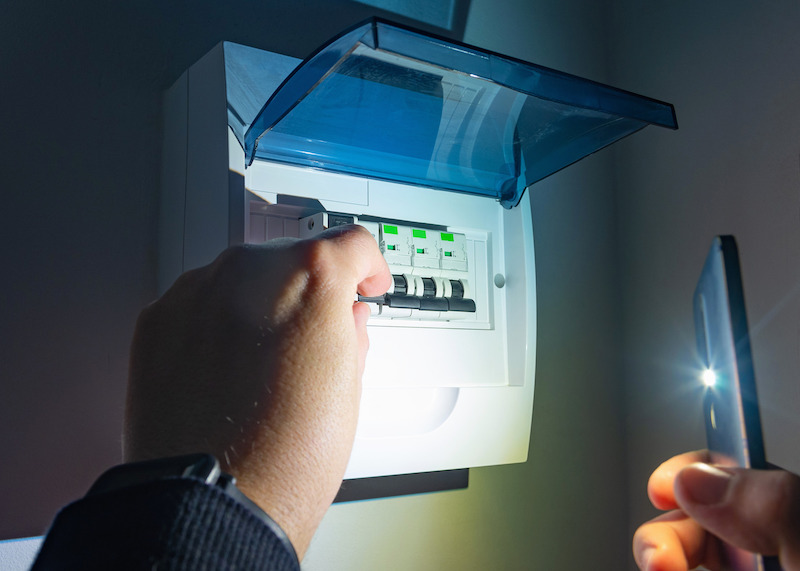Unexpected power disruptions might put you on edge. Because most of your appliances are powered by electricity, a power outage will have a significant impact on your household. Cooking, laundry, cleaning, and even your work day will be adversely affected.
7 ways to minimise the damage of a power outage in your home
Power is generally abundant and dependable, and sometimes it is easy to take it for granted. It becomes so apparent how reliant our modern households are on electricity when we suddenly find ourselves without power!
Power outages can happen at any time with no notice, they are usually caused by severe weather such as storms but they can also be caused by man made errors or faults.
When you find yourself without power, try safely troubleshooting your way back to normality and minimise the damage that having no power makes on your belongings by following these 7 suggestions:
Turn Off And Unplug Appliances
Unplug appliances to avoid power overloads or surge damage. Instead of candles, use flashlights to prevent fire hazards. Only turn off the utilities if you feel there is a risk of damage.
When you lose power, turn off and disconnect all sensitive electrical and electronic equipment, including your computer, television, wi-fi system, refrigerator, and other gadgets. Examine the area for unusual odours, such as burnt rubber, suggesting a short circuit or an electrical fire.
If the smell remains, call an electrician immediately. Examine the source of the odour and turn it off as soon as possible. If you see any sparks or smoke, contact emergency services immediately.
Examine your safety switch and fuses
Most properties in Toowoomba have a safety switch. Safety switches will be near or on the fuse box. If you’re not sure, check the fuse, usually located on the outside of your home or in the laundry.
Turn the safety switch off and then back on. This is due to the mechanism tripping inside the box but not tripping the exterior switch.
If the power isn’t restored, press the ‘test’ button. Next, turn off the fuse box and then turn on the safety switch if you have a separate safety switch and fuse box.
If the switch trips, you have a wiring or appliance problem. If the trip switch returns to the “off” position, there is a problem with the fuse box or the safety switch itself. You should call a licensed electrician immediately.
Check to see whether your neighbours also have an outage
Outages can affect a single home or an entire neighbourhood, in your troubleshooting process check the street lights at night to see if they are also out or look at your neighbour’s houses to see if they have power.
Since most residents use mobile phones and not land lines these days, without power you are still able to notify your power utility company of the outage to enable the power to be restored quicker and minimise the time spent without power.
Check your stored food
On the topic of food, when there are power outages, your food may suffer as well. Warm temperatures can promote bacterial development in food, resulting in food illness. If you have doubts on the safety of food, toss it out.
Because refrigerators are insulated, brief outages will not impact your food. However, discard it if it lasts more than a few hours, especially meat and dairy.Minimise the time spent opening the doors to prevent the warmer air from entering.
It may be necessary to use alternative cooking methods such as gas during a power outage.
Use these appliances only in well-ventilated areas. If you’re cooking with gas make sure to do so outside to avoid toxic gases or any gas leaks.
Alternatively just get some takeaway!
Is the outage a result of a bigger threat?
Natural disasters, such floods and storms can create power disruptions. Do not enter flooded areas or use any electrical equipment that has been submerged.
Keep a safe distance from fallen trees, electrical lines, and any other potential hazard. Contact emergency services if required. Sometimes the power is cut prior to the natural hazard therefore take a look at the weather warnings in your area to be notified if you need to prepare yourself.
Be prepared with a backup plan
Power outages can occur at any time, so you should always be prepared. Make sure you have a flashlight, rechargeable batteries, and backup power sources. Refrigerators and freezers can help keep your food cold for a few hours, so avoid opening them to keep them cool and last longer.
Prepare extra food and water, especially in advance of storms. Pay attention to any announcements from your utility about potential scheduled disruptions.
Why do power outages occur?
Power outages can happen anytime for various reasons, including issues with your home or with the power company. The three most common causes, however, are overloading, natural events, and human error.
Minor issues in your home, such as a breaker tripping, might cause power outages. Most of the time, you can turn it on again without any problem. However, It could also be something more catastrophic, such as electrical fires, a power outage caused by a storm, or other weather events.
How Long is the Usual Power Outage?
Power outages can vary depending on the cause and area. For example, April – June 2021 data from AUSGRID shows outages as short as 3 minutes to environmental factors to as long as 1250 minutes due to equipment fault.
There are also scheduled outages, which can persist for hours at a time and affect thousands of customers. These are the results of necessary maintenance performed by utility companies.


